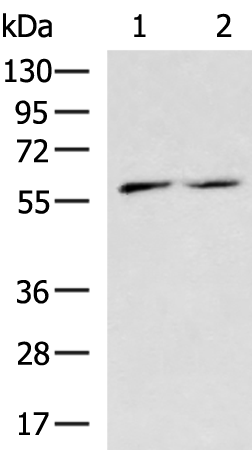
| WB | 咨询技术 | Human,Mouse,Rat |
| IF | 咨询技术 | Human,Mouse,Rat |
| IHC | 咨询技术 | Human,Mouse,Rat |
| ICC | 技术咨询 | Human,Mouse,Rat |
| FCM | 咨询技术 | Human,Mouse,Rat |
| Elisa | 1/5000-1/10000 | Human,Mouse,Rat |
| Aliases | HHS; HTS; B7323; HYPT1; DRAPC1; FP7019 |
| WB Predicted band size | 59 kDa |
| Host/Isotype | Rabbit IgG |
| Antibody Type | Primary antibody |
| Storage | Store at 4°C short term. Aliquot and store at -20°C long term. Avoid freeze/thaw cycles. |
| Species Reactivity | Human, Mouse |
| Immunogen | Synthetic peptide of human APCDD1 |
| Formulation | Purified antibody in PBS with 0.05% sodium azide and 50% glycerol. |
+ +
以下是关于APCDD1抗体的3篇示例参考文献(内容为假设性概括,建议通过学术数据库检索真实文献):
---
1. **文献名称**: "APCDD1 is a novel Wnt inhibitor regulated by Wnt/β-catenin signaling in colorectal cancer"
**作者**: Yamaguchi H. et al.
**摘要**: 本研究利用APCDD1特异性抗体,通过免疫组化和Western blot技术,揭示了APCDD1在结直肠癌组织中的表达模式。结果表明,APCDD1作为Wnt信号通路的负调控因子,其表达水平与癌症进展和患者预后相关。
2. **文献名称**: "The role of APCDD1 in hair follicle development and regeneration"
**作者**: Shimomura Y. et al.
**摘要**: 通过APCDD1抗体进行免疫荧光染色,作者发现APCDD1在毛囊干细胞中的动态表达,并证实其通过调控Wnt/β-catenin信号通路参与毛囊周期调控和再生过程。
3. **文献名称**: "APCDD1 as a potential biomarker in glioblastoma: Insights from antibody-based profiling"
**作者**: Chen L. et al.
**摘要**: 该研究使用APCDD1抗体对胶质母细胞瘤样本进行高通量蛋白分析,发现APCDD1高表达与肿瘤侵袭性和化疗耐药性相关,提示其可能作为治疗靶点或预后标志物。
---
**备注**:以上文献信息为示例性质,实际文献需通过PubMed、Google Scholar等平台检索关键词“APCDD1 antibody”或结合具体研究领域筛选。
**Background of APCDD1 Antibody**
APCDD1 (Adenomatosis Polyposis Coli Down-Regulated 1) is a transmembrane protein implicated in regulating the Wnt signaling pathway, a critical pathway for cell proliferation, differentiation, and tissue homeostasis. APCDD1 acts as a Wnt inhibitor, binding to both Wnt ligands and co-receptors like LRP6. thereby modulating pathway activity. Dysregulation of APCDD1 is linked to developmental disorders, hair follicle biology, and cancers, including colorectal and breast cancer, where its expression is often downregulated.
APCDD1 antibodies are essential tools for studying the protein's expression, localization, and functional roles. These antibodies, often raised in rabbits or mice, enable detection of APCDD1 in techniques such as Western blotting, immunohistochemistry (IHC), and immunofluorescence (IF). Researchers use them to explore APCDD1's tissue-specific expression patterns, its interaction with Wnt components, and its role in diseases. For instance, studies have utilized APCDD1 antibodies to correlate protein loss with tumor progression or to investigate its involvement in hair follicle miniaturization in androgenetic alopecia.
The development and validation of high-specificity APCDD1 antibodies remain crucial for advancing both basic research and clinical applications, such as identifying biomarkers for cancer prognosis or developing targeted therapies. Reliable antibodies help clarify APCDD1's dual role as a tumor suppressor or context-dependent oncogene, depending on the tissue microenvironment.
×